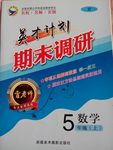


 英才计划期末调研系列答案
英才计划期末调研系列答案 精英口算卡系列答案
精英口算卡系列答案科目:高中英语 来源:2012-2013学年福建安溪一中养正中学高二上学期期末考试英语试卷(带解析) 题型:填空题
阅读下面短文,根据以下提示:1)汉语提示,2)首字母提示,3)语境提示,在每个空格内填入一个适当的英语单词,并将该词完整地写在右边相对应的横线上。所填单词要求意义准确,拼写正确。
I Believe I Can Fly is a song that tells us confidence is important.
【小题1】 my granny put it, one will make it whenever he believes
【小题2】in himself. Dreams and confidence are keep us going
【小题3】on. Three years ago I was (接纳) to the present school. However,
【小题4】I was not used to the new school life so that I did b in exams.
【小题5】 was my friends who got me to understand I would fly high
【小题6】as long as I had confidence. After several (月) of hard work,
【小题7】I made great progress. Now I am firmly (相信) that our dreams
【小题8】will come true if we try our best. W old or young, lucky or
【小题9】not, never give up when faced difficulties. Remember
【小题10】confidence is the key to (成功).
查看答案和解析>>
科目:高中英语 来源:2014届山西原平第一中学高三上学期第一次月考英语卷(解析版) 题型:阅读理解
Once my friend Peterson bought a pack of chicken, the brand of which was very famous at that time. But when he got home he found that the chicken had gone bad. He took the chicken back to the shop and he was paid twice of the price. We may say now he should have been satisfied but my friend would not like to stop. He decided to write a letter to Frank, president of the company, who was also the founder of the chicken brand.
About a week later he received a letter written by the president himself. In the letter he apologized to my friend for it whole –heartedly .There was also a card in the envelope ,with which my friend could get another pack of chicken in any of the shops. In the end my friend was asked to answer some questions.
1. When and where did you buy the chicken?
2. What was the real problem of the chicken?
3. What did the shop ass istant say when you took the chicken back to the shop?
4. W hat do you think is the reason for the chicken to go bad?
5. What do you suggest we should do to get away from such problems?
Two days later, my friend also received a telephone call from the president’s office, asking whether he had received the letter as well as the card and then some other questions. Since then, my friend has always bought chicken of this brand whenever he wants to.
1.What did the friend get when he took the bad chicken back to the shop?
A. Another pack of chicken.
B. Two packs of chicken.
C. Double the price.
D. A whole-hearted apology.
2.What did the author’s friend do when he came back from the shop after he was paid back?
A. He felt satisfied with the result.
B. He wrote a letter to the President of the US.
C. He became very angry with the shop assistant.
D. He wrote a letter to the president of the company.
3.What is the author’s friend’s attitude towards the chicken brand?
A. He still believes in it.
B. He doesn’t believe it at all.
C. He will never buy it again.
D. He has never been satisfied with it.
4.What can we infer from the passage?
A. The company may still be a top brand now.
B. The president of the company is a responsible person.
C. The company must have closed down.
D. The author may also believe in the chicken brand.
查看答案和解析>>
科目:高中英语 来源:2012年新课标版高中英语选修七 Unit3练习卷(解析版) 题型:单词拼写
单词拼写
1.Usually we can read some a(逸事)_____of famous people in the magazines.
2.He was the only w________(目击者)to that accident.
3.Because of the war, his family had to f_______(逃离) to another country.
4.The river looks very deep. Do you know the d___________ of it.
5.The company will have its a______________ celebration this Saturday.
6.Without t_______(舌头), we can’t speak, nor can we taste.
7.He was a_______(抛弃) by his cruel parents when born because of his disability
8.The mountains are r____(反射,倒影)in the clear water, forming a pleasant picture.
9.Whenever I go to the West Lake, I’m always stricken by its b__________.
10.A baby is too young to be a________(意识到) of the dangers around it.
查看答案和解析>>
科目:高中英语 来源:湖北省2010届高三6月适应性考试英语试卷试卷类型:A 题型:阅读理解
The first people who gave names to hurricanes were those who knew them best — the people of Puerto Rico. The small island of Puerto Rico is in the West Indies, off the coast of Florida. This is where all the hurricanes begin that strike the east coast of the United States. Often they pass near Puerto Rico or cross it on their way north. The people of Puerto Rico expect some of these unwelcome visitors every year. Each one is named after the Saint’s Day on which it arrives. Two of the most destructive storms were the Santo Ana in 1840 and the San Ciriaco in 1899.
Giving girls’ names to hurricanes is a fairly new idea. It all began with a story called “Storm”, written by George Stewart in 1941. In it a weatherman amused himself by naming storms after girls he knew. He named one Maria. The story describes how she Maria grew and developed, and how she changed the lives of people when she struck the United States.
Weathermen of the U.S. Army and Navy used the same system during World WarⅡ. They were studying weather conditions over the Pacific Ocean. One of their duties was to warn American ships and planes when a storm was coming. Whenever they spotted one, they gave it a girl’s name. The first one of the year was given a name beginning with [A]. The second one got a name beginning with [B]. They used all the letters from A to W, and still the storms kept coming. They had to use three lists from A to W to have enough names to go around. This was the first list of hurricane names that followed the alphabet. It served as a model for the system the Weather Bureau (局) introduced in 1942.
Before 1950 the Weather Bureau had no special system for naming hurricanes. When a hurricane was born down in the West Indies, the Weather Bureau simply collected information about it. It reported how fast the storm was moving and where it would go next. Weather reports warned people in the path of the hurricane, so that they could do whatever was necessary to protect themselves.
This system worked out fine as long as weather reports talked about only one hurricane at a time. But one week in September 1950 there were three hurricanes at the same time. The things began to get confused. Some people got the hurricanes mixed up and didn’t know which was which. This convinced the Weather Bureau that it needed a code for naming the storms in order to avoid confusion in the future.
1.Hurricanes were first named after the _________.
A. date on which they occurred
B. place where they began
C. amount of destruction they did
D. particular feature they have
2.The practice of giving girls’ names to hurricanes was started by _________.
A. a radio operator B. an author C. a sailor D. local people
3.The purpose for which weathermen of the army and navy began using girls’ names for hurricanes was _________.
A. to keep information from the enemy
B. to follow the standard method of the United States
C. not given in the article
D. to remember a certain girl
4.The Weather Bureau began naming hurricanes because it would help them _________.
A. collect information more rapidly
B. warn people more efficiently
C. make use of military (军事的) records
D. remember them
查看答案和解析>>
科目:高中英语 来源:2010年福建省福州市高三下学期第一次质量检查 题型:其他题
第Ⅱ卷(共35分)
第四部分:写作(共两节,满分35分)
第一节 短文填词(共10小题;每小题1分,满分10分)
阅读下面短文,根据以下要求:(1)汉语提示;(2)首字母提示;(3)语境提示,在每个空格内填入一个适当的英语单词,所填单词要求意义准确、拼写正确。
The college entrance exam is on the way and all the teachers
work very hard, encouraging us to build our confidence 76.
and inspiring us to i our studies. Whenever we meet 77.
with difficulties, they are r to come to our help. Meanwhile, 78.
our school also (提供)great help for us students, for example, 79.
the library stays in the evenings and even on the weekends. 80.
At home, our parents take good care of so that we can always 81.
be full of energy. I’m very grateful for the (努力)of our parents 82.
And teachers. I’m (决心)to try my best to prepare for the exam. 83.
I am sure that w their timely help I’ll be able to achieve my goal 84.
and be a useful person of our society in the near f . 85.
查看答案和解析>>
湖北省互联网违法和不良信息举报平台 | 网上有害信息举报专区 | 电信诈骗举报专区 | 涉历史虚无主义有害信息举报专区 | 涉企侵权举报专区
违法和不良信息举报电话:027-86699610 举报邮箱:58377363@163.com